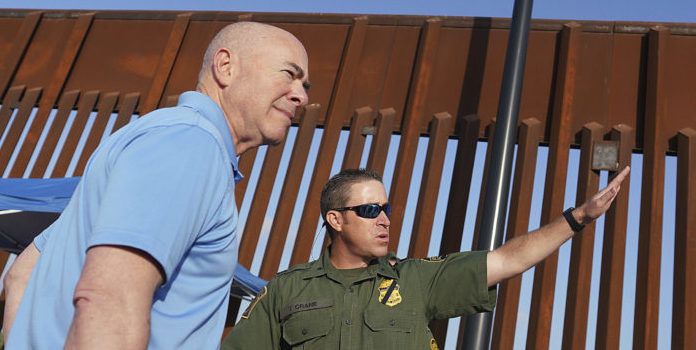(Headline USA) Homeland Security Secretary Alejandro Mayorkas said Tuesday that authorities were prepared for an anticipated increase in illegal immigrants coming from Mexico, days before the Biden administration was set to end the Title 42 pandemic-era safeguard that prevented some 2 million border-crossers from taking up permanent residences in the US interior.
Those preparations, however, were not likely to involve the enforcement of federal immigration law. Rather, in keeping with the Biden administration’s open-border’s policy to import new Democrat voters, Mayorkas likely planned to funnel additional taxpayer dollars into resources that would help process the illegals and transport them to their final destinations.
A federal judge may order the health restrictions to continue, but Mayorkas offered public reassurances of readiness after a whirlwind tour of Texas’s Rio Grande Valley, the busiest corridor for illegal crossings.
Homeland Security has said it will prepare for as many as 18,000 daily crossings, compared with a daily average of about 7,800 in April, though Mayorkas emphasized that those are not projections.
The Biden administration has sent more personnel and equipment and erected temporary holding facilities to process migrants to prepare for the end of the pandemic-era rule on Monday.
Title 42 authority, named for a 1944 public health law, forbids migrants from seeking asylum under U.S. law and international treaty on grounds of preventing the spread of COVID-19.
The agency also plans to increase prosecutions for illegal border crossings, crack down on smugglers and speed up evaluation of asylum claims, Mayorkas said at a news conference in McAllen.
“We’re a nation of immigrants and we are also a nation of laws,” he said. “We enforce the law and will continue to do so.”
While it is unusual for a Cabinet secretary to make such declarations, Mayorkas has come under considerable criticism from congressional Republicans and many others—including calls for his impeachment—due to his perceived failure to enforce the laws.
Customs and Border Protection officials stopped migrants 234,088 times on the Mexican border in April, one of the highest in decades and a 5.8% increase from 221,303 in March, according to figures released this week.
But the April tally included 20,118 Ukrainians, nearly all of them entering the country at San Diego’s San Ysidro border crossing from Tijuana, Mexico, on humanitarian parole. That number has plummeted since April 25, when the Biden administration stopped accepting Ukrainians at land crossings with Mexico and instead directed them to fly directly to the United States.
Many migrants are repeat crossers because there are no legal consequences of being expelled under Title 42 authority. In April, about 28% were encountered at least once in the previous year.
U.S. authorities applied Title 42 in about four out of every 10 encounters. The rest were deemed loosely to have a “credible fear” in their homeland and were admitted into the country as asylum-seekers.
However, the rising epidemic of dangerous drugs, gang-membership, human trafficking and violent crime suggests that some of those admitted were bringing their home countries’ problems with them.
The administration said in a court filing Monday that about 91,000 migrants were paroled into the U.S., including people permitted to make asylum claims.
Cubans continued crossing in large numbers, aided by eased travel restrictions to Nicaragua that allow them to fly from the Caribbean island nation to Central America and travel by land to the U.S. border. They were stopped 35,079 times in April, up 8.3% from 32,402 times in March and more than 10 times April 2020.
Mayorkas visited a remodeled processing center in McAllen, the region’s largest city, where migrants sat on metal benches and on sleeping mats spread on the floor, as aluminum thermal blankets made rustling noises. Televisions pointed into cells.
The center reopened about six weeks ago for about 1,200 migrants. Chain-link fences have been replaced with cinder block walls. Cells have an open roof that Border Patrol officials said provides better ventilation.
The center is divided into two sections: one for women in 17 cells of varying sizes and another for men in four wings, with about 24 rooms. There are 44 shower stalls.
Processing for immigration court appearances can take about two hours a person, with an average stay of 43 hours at the facility. Authorities distribute monitoring devices for 250 to 350 migrants released daily—although often those are free cell phones that the immigrants are supposed to use to check-in voluntarily.
Up to 600 have been released in a day to Catholic Charities of Rio Grande Valley, officials said.
Adapted from reporting by the Associated Press

